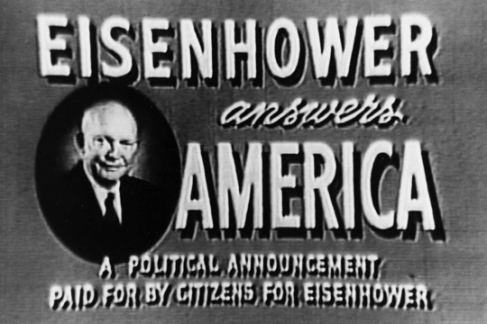Archive
The Effects of Campaign Commercials
 At first glance, campaign commercials seem to be just like every other ad on television or the internet. However, every aspect of a campaign commercial is meticulously thought of to come up the right balance of persuasion and communication to affect their audience. The effectiveness of the ad and how the message is communicated to the American public is important and can be a very influential part of the political process. In most people’s eyes, the television commercials during a campaign may not be the most significant issue, but with the average American watching 151 hours of television per month, commercials might be the most effective way of spreading candidate’s ideas. The study of campaign commercials showed the effectiveness and diversity of tactics used in elections to promote a candidate.
At first glance, campaign commercials seem to be just like every other ad on television or the internet. However, every aspect of a campaign commercial is meticulously thought of to come up the right balance of persuasion and communication to affect their audience. The effectiveness of the ad and how the message is communicated to the American public is important and can be a very influential part of the political process. In most people’s eyes, the television commercials during a campaign may not be the most significant issue, but with the average American watching 151 hours of television per month, commercials might be the most effective way of spreading candidate’s ideas. The study of campaign commercials showed the effectiveness and diversity of tactics used in elections to promote a candidate.
In the political spectrum, campaign commercials prove to be one of the most influential forms of promoting a candidate. It is extremely apparent that media has become rampant within all aspects of society and there is no difference in the political process. The impact of an ad can swing the vote one way or another. The expression of the candidate’s ideas and policies summed up in less than a minute has the ability to change voter’s minds. Our society has become one that enjoys quick, direct points rather than long, drawn out arguments and the means of communication to the public have changed with campaign commercials. Arthur Sanders of Drake University argues that “They (TV ads) are the most powerful way still to reach voters who are only paying limited attention to a campaign. … People who see TV ads usually end up knowing more about candidates than people who don’t. The public is persuaded by ads; they pay attention to ads.” Sander reiterates the impact that these commercials can have on the public. During the 2008 Presidential election there were 29,000 political television ads aired in Virginia and 20,000 in New Jersey (two swing states), according to Taegan Goddard’s Political Wire. This is a testament to the importance placed on the commercials.
The main objective of campaign commercials is to attract voters, especially the undecided voters. An effective ad must appeal to emotions, be persuasive, be truthful, and effectively utilize style. To achieve the desired emotional effect, the ad needs to establish a strong tone that clearly advances its argument and the effect of that argument, while being clear in how the producer wants viewers to feel. Persuasion is the main goal of the ad; to persuade voters, a central issue should be clearly defined and the importance of this issue should be effectively demonstrated to make an argument that convinces with logic and evidence. A candidate must be trusted to be elected and their commercials should prove his/her trustworthiness. Their commercial should present multiple specific factual claims with clear references to reliable sources. The cinematic style also plays an impact on the effectiveness of an ad. The use of video, photographs, sounds, music, editing, and transitions can be used to successfully communicate political ideas while creating a powerful dramatic effect.
The effectiveness of campaign commercials plays a vital role in political process. The support of candidates can ride on the way these commercials are presented to the public. With media becoming more influential in today’s society, candidates will be paying more attention to their ads on television.
To view more information on campaign commercials and to see prior Presidential campaign ads, visit http://www.livingroomcandidate.org/
Dwight Eisenhower was the first Presidential candidate to use television to promote his campaign ads. The image above is from the first Presidential campaign commercial ever; it aired in 1952.
